Posts Tagged ‘Nadine Gordimer’
PEN Journey 46: Wrapping Up
PEN International celebrates its Centenary in 2021. I’ve been active in PEN for more than 30 years in various positions and now as an International Vice President Emeritus. With memories stirring and file drawers of documents and correspondence bulging, I am a bit of a walking archive and have been asked by PEN International to write down memories. I hope this personal PEN journey will be of interest.
I finished my term as International Secretary of PEN July 2007 at PEN’s 73rd World Congress in Dakar, Senegal. I handed over the responsibility to my longtime colleague Eugene Schoulgin (Norwegian PEN) who would continue to work with the Board, the Executive Director Caroline McCormick, new Treasurer Eric Lax and President Jiří Gruša. We had executed many changes in the last three years, and those who had been involved were continuing and active both in the international leadership and in the PEN centers.
Before the Congress, the staff and PEN members gave me a farewell party at PEN International’s relatively new London headquarters on High Holborn. PEN is about people, and I’d been fortunate to work over many decades with dozens of talented writers who were also competent in organizational work, friends from around the globe who remain friends today.
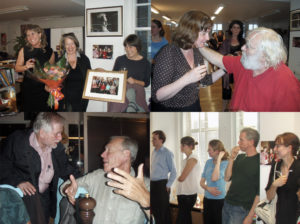
PEN International Farewell gathering in London 2007 with friends and staff, including Caroline McCormick, Joanne Leedom-Ackerman, Jane Spender, Sara Whyatt, Moris Farhi, Peter Firkin, Eugene Schoulgin, Frank Geary, Emily Bromfield, Mitch Albert, Mandy Garner.
As a Vice President, I would continue to work, write appeal letters to governments for the Writers in Prison Committee (WiPC)’s RAN (Rapid Action Network) cases, speak when asked and hold meetings in Washington when asked, but I could return to being a writer. American PEN’s Executive Director Michael Roberts asked me to join American PEN’s board. I demurred and said I needed a break, but he and others urged me so in 2008 I joined the board of PEN America but worked at a far less intense pace for the next six years. When American PEN’s new Executive Director Suzanne Nossel came on, I was asked to extend for an additional year as a Vice President while she oriented to PEN’s international work. It is difficult to step away from PEN though most who are engaged find they must for a time, though not too far away.
As I left the historic Senegal Congress that July 2007, I boarded a plane and flew out over the Atlantic to Italy where I met up with my husband by a lake in one of our favorite spots for a vacation. He had patiently waited those three years as I spent 10-15 days a month on the road. In the first week without PEN’s emails and phone calls and conferences, we talked; I wrote, and I read four books in six days.
Back home I soon realized I needed to join the 21st century as a writer. At PEN we had begun to use some tools of social media in publicizing cases of writers under threat, but I hadn’t engaged personally. I remember sitting with a group of women writers in Washington, DC, many younger than me, who were talking about their websites and blogs and Twitter, and Facebook. In 2007 writers having URLs, Twitter handles, Facebook pages was relatively new. Twitter had only launched the year before, and though blogs had been around for a few years, I had never written one. Facebook seemed an odd medium, also only a few years old. I was of the “private” generation; we were not prone to sharing our activities and feelings on a “social” platform. Those of us who’d been journalists were used to having to condense stories, but never to 140 characters which Twitter demanded. We were in a new communications age, and I needed to understand and at least to put a toe in the water, even if I didn’t jump fully in.
Encouraged by friends and agent, I set up a website. The developer urged me to blog. I didn’t want to blog, I explained. I wanted to write fiction and occasional journalism, but I agreed to post a blog once a month. I have done so for over ten years now. Often when I considered what was worth writing about each month, I found myself reflecting on work with PEN. When asked to write about PEN’s history as I’d witnessed it in anticipation of the Centennial, I reasoned I could post twice a month. That seemed a reasonable way to get through PEN’s history year by year. A serial blog. I have sped up the pace since Covid locked us all into our homes and travel has halted. I have now come to an end of this particular PEN Journey though I will write an introduction. I will also reference links to those blog posts I wrote after 2007 when I continued to work with PEN.
In this final post, I want to review a few areas of PEN International I feel I haven’t explored sufficiently, and I want to give a quick view forward of what and who came next.
In Journey’s 7, 8, 22, 25, 26, I touched on the work of the PEN Emergency Fund. I want to highlight that here. Founded in 1971 by Dutch Writer A. (Bob) den Doolaard who had an active role with PEN International, the PEN Emergency Fund fulfilled a missing link in PEN’s work. Doolaard noted that PEN had no mechanism to grant material aid to writers, especially those under threat who had to flee their countries so he and Dutch PEN set up the aid fund based in the Netherlands, operated under Dutch law. The PEN Emergency Fund gives a one-time grant to writers in dire circumstances and is able to act quickly. Over the years PEN’s Emergency Fund has provided rapid support for writers on every continent, especially those in Eastern Europe during the Communist era and those in the Balkans War in the 1990s and also to persecuted writers in Asia, Africa and Latin America. Every year dozens of writers have been helped with grants that have bridged to longer term answers. The Fund operates in close collaboration with PEN International whose professionals furnish the Fund with information and with the PEN centers and members who have contributed to the Fund. I’ve had the privilege of serving on the PEN Emergency Fund Advisory Board for a number of years.
Prizes: As a literary organization, PEN through its centers awards numbers of literary awards, but only a few literary prizes have been awarded by PEN International. Over the years the idea of a PEN International Prize for Literature or even for Peace has arisen. When I first took on the position of International Secretary, we were approached by a donor offering to give PEN $100,000 for the PEN International Prize for Peace. Well-meaning though the donor was, it quickly became clear that PEN International could not accept. The donor already had his first winner in mind—Bono. We explained that any prize would have to be independently judged with established criteria and nominating processes, and in order for PEN to give an annual prize, we would need to have a substantial financial commitment in an account to assure we could afford the prize each year as well as the cost of the judging and ceremony. We named the figure. The discussions broke off though the donor, I think, did find another way to give his prize though not through PEN.
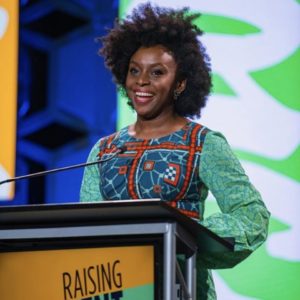
Chimamanda Adichie, PEN David T. Wong International Short Story Prize winner.
The biennial PEN David T. Wong International Short Story Prize did come into being for a time, with a much more modest monetary award for a new writer, open to nominations by all PEN Centers and run by International PEN Foundation’s Gilly Vincent, who later became General Secretary of English PEN. Gilly was a pro and lined up well-qualified writers as judges. The nominations came in from PEN Centers around the world and the winner was often celebrated at PEN’s Congress. One of the first winners for 2002-2003 was a young Nigerian writer Chimamanda Adichie, who won for her short story “One Half of the Yellow Sun,” submitted by her local PEN Center USA West. The story went on to become the celebrated novel by the same name, and she went on to win wide international acclaim for that and other books. The PEN David T. Wong Prize was one of the first international recognition of her as a writer. The judges for 2003 were William Trevor, Michele Roberts and J.M. Coetzee who won the Nobel Prize for Literature later that year. The 2001 prize had been won by Rachel Seifert, who went on to have her first novel short-listed for Booker Prize.
PEN International’s Writers in Prison Committee, the PEN Emergency Fund and Oxfam Novib each year do give the Oxfam Novib/PEN International Free Expression Award to writers who work for freedom of expression in the face of persecution. The award is given to writers and journalists committed to free speech despite the danger to their own lives.
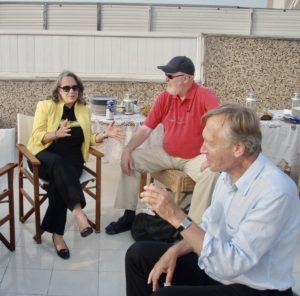
Turkey visit—on the roof with Joanne Leedom-Ackerman, Carl Morten and Eugene Schoulgin (Norwegian PEN)
Many other literary awards and literary festivals are hosted by PEN’s centers around the world. I had the pleasure of visiting a number of those, including in Croatia and in Turkey, hosted by the PEN centers.
There are many aspects of PEN’s work I’ve touched on but not explored fully such as the formation of a PEN center, which technically can occur when 20 reputable writers get together and petition the International office. There is a limit of five centers per country; most countries have fewer, and many countries have only one center. The rationale for additional centers has been to reflect linguistic diversity in a country. For instance, Switzerland has French, German, Italian, and Esperanto centers, or to facilitate participation when the land mass is large. The U.S. used to have two centers, one based in New York and one in Los Angeles, but in the past years, the two centers have merged into one PEN America. In Canada where there is both large land mass and diverse languages PEN has two centers—PEN Canada based in Toronto essentially uses English as the primary language and Quebecois PEN uses French. In some countries there are many, many languages as in India, which also has a large landscape and has the All-India Center in Bombay and the PEN Delhi Center. The rationale depends largely on the ambition and needs of the writers on the ground. Often a center will form branches within a country to provide the services and community for writers.
One document I did not include in an earlier post was the rationale from PEN International Vice President and Nobel Laureate Nadine Gordimer regarding the formation and naming of centers as related to a petition from writers in South Africa to form an Afrikaans Center. I’ve copied it here because it was from one of PEN’s eminent and active members and because it articulated ongoing questions in PEN. Gordimer’s argument did not prevail at the Berlin Congress in 2006 where an Afrikaans Center, not a Pretoria Center, was voted in though the center is based in Pretoria. The reasoning nonetheless is worth considering. The dynamics are ongoing in a number of countries and will likely continue as new centers are added or removed when they grow inactive.
Nadine Gordimer: “Let me make it clear. My objection to the formation of an Afrikaans language PEN club has no significance whatever of any kind of prejudice against my brother and sister South Africans, who are Afrikaans speakers and writers just as I am an English-speaking writer. We have eleven languages in our country. I should have exactly the same objection to the formation of an isiZulu or isiXhosa Club. We cannot have separate-but-equal (shades of apartheid) Clubs for every language, even though most of which have the strong linguistic claim of ante-dating colonially imported English and colonially created Afrikaans. I support a vigorous and linguistically open South African PEN Club, to have local representation in each region, with membership actively pursued among writers in whatever South African languages are theirs. Only such a chapter could have the strength to fulfil our needs…Historic-culturally determined circumstances give us both the necessity to overcome them and the fine opportunity to make full use of them, for our writers and our poly-literature.”
PEN is a breathing, living organization whose main body has been working around the world for a century with new members and centers joining every year as other centers at times have fallen dormant or closed. It is a fellowship of writers, of citizens in civil society holding watch over freedom of expression, linguistic diversity, over literature, and over the imagination and art by which societies flourish. Particular issues and threats change according to the times. PEN declares itself an apolitical organization, yet it is an organization whose central principle and commitment to freedom of expression sets it in the fray of politics since an early warning of a society descending into authoritarianism is the arrest of its writers and the closing down of space for free expression.
Changes in PEN leadership internationally and in centers effect the organization, but the Charter holds the whole body together. The leadership of PEN International used to reside in the President, the International Secretary and the Treasurer as the Executive, which represented the Centers’ Assembly of Delegates between two annual Congresses. The narrative of this PEN Journey has shown the change in the organization and its governance as it has grown and the world in which it operated has altered. PEN International has more than doubled in size over the last three decades to 155 centers in more than 100 countries. It now holds only one Congress a year, and the leadership is a partnership among the President, the International Secretary, the Treasurer, and an elected 7-member Board representing the Centers. Work is facilitated by an Executive Director, a position first hired in 2005, who heads the staff. Depending on the skills and experience and personality of each, the dynamic changes. In my term, I tended to be hands-on as an International Secretary. The President Jiří Gruša with whom I served was engaged as the Director of a Diplomatic Academy and had not been very active in PEN before he took the role of President. I would check in with Jiří before each monthly board meeting, explain the agenda as I saw it, ask if he wanted to add or change any items and if he wanted to attend. Jiří, a former prisoner of conscience, had lived the principles of PEN, understood them and with experience, knowledge and wit was an authentic voice on the international stage. But the day-to-day decision-making and running of the organization he largely left to me and then with the first Executive Director, the Board and the staff.
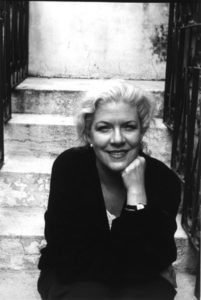
Jennifer Clement, PEN International President 2015-2021
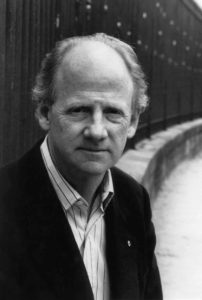
John Ralson Saul, PEN International President 2009-2015
Jiří’s successor John Ralston Saul, former President of PEN Canada, had been a long time PEN member, active in the organization with experience in governing. He took on a much more active role as President, working with International Secretary Eugene Schoulgin (Norwegian PEN) and then International Secretary Hori Takeaki (Japan PEN). John traveled the globe visiting PEN centers and government officials and taking on the issues of his period. After John, PEN elected its first woman President Jennifer Clement, former President of PEN Mexico, who took on the work, along with a special focus on the issues of women globally. She spearheaded, along with PEN’s Women Writers Committee, a Women’s Manifesto and later an Imagination Manifesto and will serve until the end of the Centenary Congress in England in 2021. Kätlin Kaldmaa (Estonian PEN) has served as International Secretary during this time along with longtime PEN member Carles Torner as Executive Director.
Unfortunately over the years as PEN’s website has been upgraded, the content has not always been exported so many of the documents and speeches and records have not followed into the digital universe. The narrative is carried in paper files which overflow in my basement and even more in PEN’s and in the memories of PEN members. My own PEN Journey has been an effort to record some of the history and offer a continuity of narrative during a particular period, through the eyes of one PEN member who has had the privilege and pleasure of standing up close for part of that history. I’ve tried to render the direction and actions. The flaws, the missteps of people, including myself, I’ve also witnessed but have largely left to the side in this narrative. My purpose has not been to be a critic nor a hagiographer, nor a novelist, but a reporter, recording the actions and the journey with a touch of personal memoir.
I will leave this journey by quoting from PEN’s Democracy of the Imagination Manifesto, unanimously passed at the 85th PEN World Congress in Manila, Philippines, October 2019:
The opening of the PEN International Charter states that literature knows no frontiers. This speaks to both real and, no less importantly, those imagined.
PEN stands against notions of national and cultural purity that seek to stop people from listening, reading and learning from each other. One of the most treacherous forms of censorship is self-censorship —where walls are built around the imagination and often raised from fear of attack.
PEN believes the imagination allows writers and readers to transcend their own place in the world to include the ideas of others. This place for some writers has been prison where the imagination has meant interior freedom and, often, survival.
The imagination is the territory of all discovery as ideas come into being as one creates them. It is often in the confluence of contradiction, found in metaphor and simile, where the most profound human experiences reside.
For almost 100 years PEN has stood for freedom of expression. PEN also stands for, and believes in, the freedom of the empathetic imagination while recognizing that many have not been the ones to tell their own stories.
PEN INTERNATIONAL UPHOLDS THE FOLLOWING PRINCIPLES:
- We defend the imagination and believe it to be as free as dreams.
- We recognize and seek to counter the limits faced by so many in telling their own stories.
- We believe the imagination accesses all human experience, and reject restrictions of time, place, or origin.
- We know attempts to control the imagination may lead to xenophobia, hatred and division.
- Literature crosses all real and imagined frontiers and is always in the realm of the universal.
Next and final installment of PEN Journey: Introduction—the Curtain Rises
Links below are to blog posts mentioning PEN after 2007. I was not writing official reports of Congresses or WiPC conferences or other events, but reflecting on PEN’s work, cases and the impact of ideas in my own monthly posts, some of which I used in writing this PEN Journey:
The Journey of Liu Xiaobo: From Dark Horse to Nobel Laureate
March 31, 2020
Arc of History Bending Toward Justice?
March 20, 2019
Gathering in Istanbul for Freedom of Expression
May 23, 2018
Women’s Voices Rising (Women’s Manifesto)
February 28, 2018
Liu Xiaobo: On the Front Line of Ideas
December 7, 2017
Reclaiming Truth In Times Of Propaganda (83rd PEN Congress in Lviv, Ukraine)
September 28, 2017
“Finding Room for Common Ground: No Enemies, No Hatred”
September 8, 2017
In Turkey, a show of solidarity with writers behind bars (PEN Turkey Mission)
February 3, 2017
Power on Loan
January 23, 2017
Hope for Songs Not Prison in 2017
December 27, 2016
Building Literary Bridges: Past and Present (82nd PEN Congress in Ourense, Spain)
October 3, 2016
Call for Help inside Iran’s Evin Prison
May 23, 2016
Spring and Release
March 18, 2016
View on the Bosporus: Rights in Retreat
January 29, 2016
Democracy in Africa: Who Can Chat with Kabila?
November 30, 2015
Life instead of Death…Rationality instead of Ignorance (81st PEN Congress in Quebec, Canada)
October 23, 2015
What Are You Not Reading This Summer? (WiPC Conference in Amsterdam)
June 11, 2015
Times and Tides
November 14, 2014
PEN on the Plains of Central Asia (80th PEN Congress in Bishkek, Kyrgyzstan)
October 7, 2014
Poets, Pardons and Ramadan
August 2, 2014
Women’s Progress: The Power of a Bridge…and a Double Yellow Line
March 12, 2014
Qatar: A Poet in a Desert Cell
November 1, 2013
The Last Colony?
October 15, 2013
Parallel Universe in a Glassed Concert Hall in Iceland (79th PEN Congress in Reykjavik, Iceland)
September 16, 2013
Living In and Beyond History (WiPC Conference in Krakow, Poland)
May 20, 2013
Two Voices Behind the Iron Doors
April 8, 2013
North Korean Writers in a Land of the Rising Sun (78th PEN Congress in Gyeongju, South Korea)
September 15, 2012
facebook or not?
June 28, 2012
Voices Around the World
January 30, 2012
Bridge Over the Bosporus: Citizenship on the Rise (77th PEN Congress, Belgrade, Serbia mentioned)
September 28, 2011
Tourist in Beijing: A Dance with the Censor
July 29, 2011
Ice Flows: Freedom of Expression
January 29, 2011
In the Woods: On History’s Doorstep
December 22, 2010
Full Moon Over Tokyo (76th PEN Congress in Tokyo, Japan)
September 30, 2010
Introducing Isabel Allende
May 21, 2010
“Because Writers Speak Their Minds”–2
March 31, 2010
“Because Writers Speak Their Minds”
February 24, 2010
Haitian Farewell
January 18, 2010
Yellow Geranium in a Tin Can
October 27, 2009
China at 60–Fate of Liu Xiaobo?
September 30, 2009
A Time of Hopening (WiPC Conference in Oslo, Norway)
June 24, 2009
“There Will Still Be Light” *
April 30, 2009
The Intensifying Battle Over Internet Freedom
February 24, 2009
Charter 08: Decade of the Citizen
December 30, 2008
China from the 22nd Floor (Hong Kong Conference)
May 28, 2008
OLYMPIC RELAY– A POEM ON THE MOVE
April 21, 2008
Words That Matter
March 4, 2008
PEN Journey 42: From Copenhagen to Dakar to Guadalajara and in Between
PEN International celebrates its Centenary in 2021. I’ve been active in PEN for more than 30 years in various positions and now as an International Vice President Emeritus. With memories stirring and file drawers of documents and correspondence bulging, I am a bit of a walking archive and have been asked by PEN International to write down memories. I hope this personal PEN journey will be of interest.
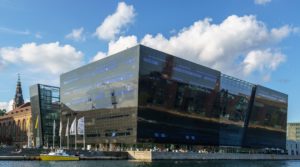
Royal Danish Library extension in Copenhagen, dubbed the Black Diamond (Photo by © User:Colin / Wikimedia Commons, CC BY-SA 4.0, https://commons.wikimedia.org/w/index.php?curid=66870365)
Arriving in Copenhagen in early September 2006, I walked along the waterfront, dodged bicycles and shared coffee and conversation with longtime colleague Niels Barfoed, former President of Danish PEN who had briefly succeeded me as Writers in Prison Chair and was an eminent Danish journalist and writer. We met at the new waterfront extension of the Royal Danish Library, dubbed the Black Diamond because of its imposing black granite cladding and irregular angles. Niels would be moderating a public meeting on Freedom of Expression in the Arab World.
PEN International’s base was broadening in the Middle East and in Africa, both regions where active centers for writers were fragile, but potentially important havens. Danish PEN was hosting a conference with a dozen writers from the Arab-speaking world, including representatives from Egypt, Morocco, Jordan, Palestinian PEN, Tunisia, Lebanon and invited writers from Iraq and the United Arab Emirates (UAE), along with Danish and Norwegian PEN members and International PEN represented by Centers Coordinator Peter Firkin and myself.
The Copenhagen conference had been initiated in part as a response to the Danish cartoons controversy earlier in the year and also as an opportunity to develop PEN’s work and presence in the Middle East. PEN had a few centers in the region and interest from writers in Jordan, Iraq, Kuwait, and Bahrain to form additional PEN centers and a desire to revive PEN Lebanon. Developing PEN centers in these areas was challenging given the politics and conflicts on the ground.
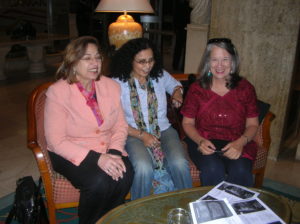
Ekbal Baraka, President Egyptian PEN (left) and Joanne Leedom-Ackerman, PEN International Secretary (right) meeting in Cairo, 2006
The Copenhagen meetings explored common fields of interest among Western and Arab writers, networking among Arab writers and ways in which PEN could assist. Women writers in the Arab world had particular challenges, a discussion led by Egyptian PEN President Ekbal Baraka. Ekbal later became Chair of PEN International’s Women Writers Committee. Algerian PEN and International PEN board member Mohamed Magani offered to host a subsequent meeting in Algiers the following fall, along with a conference on translation. A public event in the evening showcased the work of the visiting writers.
On the final day the public conference on Freedom of Expression in the Arab World moderated by Niels included discussions on Networking in the Cause for Freedom of Media and Opinion and featured renowned Tunisian journalist and human rights campaigner Sihem Bensedrine. A discussion on Access to Information: Implications to Development was addressed by Jordanian journalist Daoud Kuttab and Danish columnist and Danish PEN President Anders Jerichow. Lebanese Writer Elias Khoury and Egyptian journalist and commentator Mona Eltahawy concluded the conference in a discussion on Publication and Powerplay in the Middle East.
The days together resulted in a loose network of these and other Arab writers and eventually led to the opening of additional PEN centers and work in the Middle East. PEN currently has Bahrain, Iraq, Israel, Jordan, Lebanon, and Palestinian centers as well as the Egyptian, Algerian and Moroccan Centers.
******
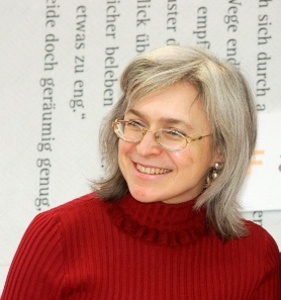
Anna Politkovskaya, Russian journalist assassinated, 2006
A few weeks after the Copenhagen conference, my phone rang early on Saturday morning October 7, 2006 at my home in Washington, DC. Sara Whyatt, PEN International’s Writers in Prison Committee Director, was on the line. She called to tell me that Anna Politkovskaya, Russian journalist, PEN member who’d visited PEN Congresses and meetings, who’d worked for years reporting on Chechnya—had been assassinated. The report was that Anna had been shot that morning in the elevator of her apartment building in Moscow.
For seven years Anna had been one of the few reporting on the war in Chechnya despite intimidation and violence. She had been arrested by the Russian military and suffered a mock execution; she’d been poisoned while flying from Moscow to the Beslan school hostage crisis and had to turn back to get medical treatment. She had survived many dangerous encounters. But now she had been killed.
The killing of Anna Politkovskaya swept through the news media around the world as well as through the PEN world. We were stunned and deeply saddened and then began our protests and calls for investigation, along with human rights organizations worldwide. PEN honored Anna at its subsequent Congress and meetings and annually held an Anna Politkovskaya lecture on the anniversary of her death to commemorate her fortitude and inspiration.
The work in PEN was a helix of hope and pain and sorrow and hope again.
******
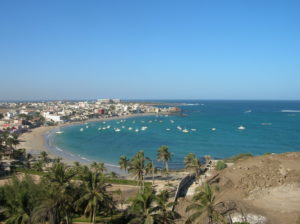
Dakar, Senegal, venue for PEN’s upcoming 73rd World International Congress in 2007
At the end of November Senegalese PEN hosted a meeting with African centers engaged with the planning of PEN’s 73rd Congress to be held in 2007 in Dakar. The meeting included representatives from Egypt, Morocco, Algeria, Guinea, Senegal, Nigeria, Sierra Leone, and Ghana. It was standard practice for International PEN to visit the site of an upcoming Congress to review logistics and budgets and programs in advance, to assist and assure the Congress ran smoothly. The 73rd Congress in Dakar would be only the second time a PEN Center in Africa had hosted a World Congress. In addition to reviewing the facilities at the Meridien hotel by the ocean, the delegation met with the Minister at the Ministry of Culture and Classified Historical Heritage which was supporting the Congress.
At that meeting and throughout the Congress to come, I offered the sentiment I had drafted and memorized in French and still endorse:
“Il n’y a que quelques autres pays dans le monde ou l’ecrivain est plus honore qu’au Senegal.
“There are few countries in the world where the writer is more honored than in Senegal.”
Because Senegal’s founding President Leopold Senghor had been a poet and writer of global distinction, also a Vice President of International PEN, Senegal celebrated literature. “As a national leader, Leopold Senghor left a rich heritage and respect for African culture and writing which we hope to honor by International PEN’s upcoming Congress in Dakar,” I told the Minister.
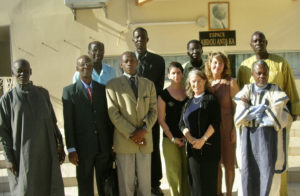
Karen Efford, PEN Program Officer, Joanne Leedom-Ackerman, PEN International Secretary, and Caroline McCormick, PEN International Executive Director, meeting in Dakar. Senegalese PEN members organizing PEN 73rd World Congress included Abdoulaye Racine Senghor, Abdoulaye Fode Ndione, Mamadou Diop Traoré, Seydi Sow, Mbaye Gana Kehe, Alioune Badara Beye, Elie-Charles Moreau, Silcarneyni Gueye, Aissatou Diop
Senegalese PEN hosted our working meetings at its headquarters where the focus was also on regional development. International PEN’s Executive Director Caroline McCormick and Program Officer Karen Efford led a “mapping” or gathering of information with each center on its activities and membership and needs in order to determine how PEN International could assist, especially with fundraising. The Centers also participated in the discussions on the programs and facilities for the July 2007 Congress.
After hours of meetings, we all went to dinner together at the local restaurant. I don’t remember the food, except there were generous plates family style. I remember the atmosphere—the bright blues and reds and yellows in the restaurant, the music, and the laughter after a long day concentrating on budgets, logistics, and translations. The planning meetings were work but also fun with friendships among the writers from the PAN Africa Network with whom I had met on numerous occasions over the past few years.
In my three years as International Secretary, I was impressed by the care of all the host centers for Congresses. The Congress in Senegal would be my last as an officer of International PEN, except for the privilege of attending as a Vice President in the years to come. The operational work and responsibility would be passed on. I had determined not to stand for a second term. I had other responsibilities that had been put on hold for three years, and I had learned it was better to leave a position when everyone wanted you to stay, than to stay too long when people were waiting for you to leave. I needed to return to being a writer and to my family and to the other organizational work I did. So Senegal would be a farewell of sorts for me. It would prove to be a grand occasion, but I am getting ahead of myself…
******
“Does Freedom of Expression Have a Limit?” “Hospitality without Borders.”—those two panels I participated in and moderated at the 2006 Gothenburg Book Fair, Scandinavia’s largest. The International Publishers Association (IPA) and International PEN had been collaborators in selecting the Fair’s theme of Freedom of Expression that year. The Book Fair reflected the Freedom of Expression theme in many of its over 2000 events for the 100,000 visitors. PEN and IPA, along with the International Cities of Refuge Network (ICORN), had an exhibit with a stage where events and seminars took place.
For me, it was a special pleasure to attend the Fair in Sweden where my mentor and predecessor as Writers in Prison Chair Thomas von Vegesack was a respected and now retired publisher. Thomas attended the Book Fair. I noted in my remarks that it was from Thomas I’d learned the difference between having principles and simply talking about principles. Thomas didn’t like “principles,” which meant he didn’t like paradigms of abstractions. Our role—PEN’s role—was pragmatic. It was to help writers in trouble, to be in touch with them and their families so the isolation of imprisonment was broken, to give them support and most of all to figure out where the access was within our PEN centers and within our larger freedom of expression community to pressure governments to spring open the prison doors and also to get protection for writers under death threats. (It was two weeks after the Gothenburg Book Fair that Anna Politkovskaya was assassinated.)
The world had changed since the days Thomas and I had been chair of WiPC. In the late 1980’s and early 1990’s we had all been hopeful that the fall of the Berlin Wall and the fall of the totalitarian governments would ease the situation for writers worldwide, but there were now as many writers as ever under threat. PEN’s casebook listed over 1000. There were more non-state actors. There was also a level of global communication that was only budding in 1993 when Thomas handed over the reins to me. There were new bad guys, and many of the good guys were not as good as they once were. We were in a world where freedom of expression was no longer accepted as an unqualified value.
Yet “the world is still changed by ideas and books, and writers who write them are still the main vehicle for ideas,” I concluded my opening talk.
On the panel “Does Freedom of Expression Have a Limit?” we had no easy answer. We asked if there was a personal and public responsibility to tell the truth, or at least not to lie. And who determined a lie? The responsibility of the writer was to try to find and tell the truth even if truth seemed relative at times. The question arose, who sets the limits on freedom of expression? The State? Society at large? What were those limits and penalties and were they set by fear of attack or violence or censorship?
It was generally agreed that calls for violence such as the killing of another human being set a limit on freedom of expression, especially when this call came from someone who had the power of the state to exercise the threat. An example was the fatwa on Salman Rushdie. The limit should not be on Rushdie but on the Ayatollah and the state that issued the fatwa calling for his death.
Hate speech had a limit when it urged violence as in the case of Radio Rwanda during the genocide against the Tutsis or certain broadcasts during the Balkans wars.
PEN’s Charter contained the elements of the dialectic upon which free societies were based, both the respect for other cultures in an effort to dispel race, class and national hatreds and also a commitment to protect the free and unhampered transmission of thought and ideas.
“And since freedom implies voluntary restraint, members pledge themselves to oppose such evils of a free press as mendacious publication, deliberate falsehood and distortion of facts for political and personal ends,” the PEN Charter concluded.
Democracies flourish only when an exchange of competing, even contradictory, ideas can occur in a battle of ideas, the panel concluded.
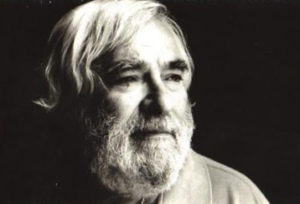
Novelist Moris Farhi, former WiPC Chair and PEN Vice President/English PEN
The panel “Hospitality Without Borders,” co-sponsored by ICORN, featured Orhan Pamuk, the Turkish novelist who a month later won the Nobel Prize for Literature, and Moris Farhi, also Turkish but long resident in the UK and member of English PEN. Moris had followed me as Chair of PEN’s Writers in Prison Committee after Niels Barfoed’s brief tenure.
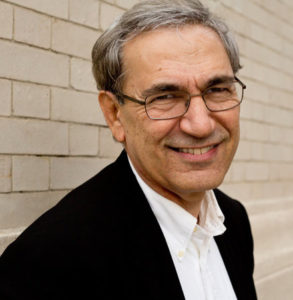
Novelist Orhan Pamuk (Photo credit: © Elena Seibert)
The previous year, Orhan had faced charges of “insulting the Turkish Army and Turkishness” because of his statement in a Swiss newspaper regarding the Armenian genocide and massacre of a million Armenians and 30,000 Kurds in Anatolia in 1919. On the panel Orhan noted how valuable it was for a persecuted writer in his home to know about the possibility of finding refuge in a safe city, even if he didn’t take advantage or was unable to leave his present situation at the time.
Moris, who’d also chaired English PEN’s Writers in Prison Committee, talked about the challenges facing the host city and the community receiving a guest writer. He focused on how to make sure the writer didn’t just disappear from the literary community and the need to focus on translation and publishing strategies for the writer. It was important to help the writer establish new foundations and relationships in a new city.
I recalled the situation of Bangladeshi novelist Taslima Nasreen who had faced death threats and was given asylum in Sweden and awarded the Tucholsky prize. Taslima Nasreen’s was one of the more dramatic cases in my PEN history as she was whisked out of Dhaka in the dark of night and brought to Stockholm by Swedish PEN. That had turned out to be just one stop on a difficult journey into exile.
******
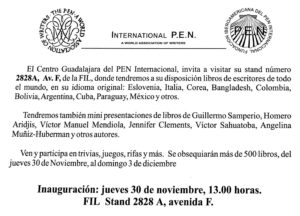 At the end of 2006, PEN Guadalajara, San Miguel PEN and the Ibero-American Foundation of PEN established a presence for the first time at the 20th Guadalajara Book Fair. The Guadalajara Book Fair was considered the most important publishing event in the Spanish-speaking world, hosting 450,000 visitors and 15,000 book professionals from over 40 countries. Officials of the Guadalajara Book Fair were eager to have a relationship with PEN in order to collaborate and “create and guarantee space in which literature of different languages cohabit supporting the freedom of opinion with words as vehicle of understanding between different nations and cultures,” according to the Coordinator of the Festival events.
At the end of 2006, PEN Guadalajara, San Miguel PEN and the Ibero-American Foundation of PEN established a presence for the first time at the 20th Guadalajara Book Fair. The Guadalajara Book Fair was considered the most important publishing event in the Spanish-speaking world, hosting 450,000 visitors and 15,000 book professionals from over 40 countries. Officials of the Guadalajara Book Fair were eager to have a relationship with PEN in order to collaborate and “create and guarantee space in which literature of different languages cohabit supporting the freedom of opinion with words as vehicle of understanding between different nations and cultures,” according to the Coordinator of the Festival events.
International PEN aspired to have a more robust presence at book fairs globally, but did not yet have the budget or staff. However International PEN supported centers’ activities at book fairs such as at Frankfurt, Gothenburg, and now Guadalajara. I visited the Guadalajara Book Fair as part of this initiative.
PEN Guadalajara and San Miguel and the Ibero-American Foundation of PEN hosted a stand at the Book Fair and offered readings and presentations of books and displayed hundreds of books from PEN members and PEN centers around the globe. On the Book Fair’s program two eminent PEN members, Vice President Nadine Gordimer and former PEN International President Mario Vargas Llosa were featured. Nadine Gordimer participated in a Literary Salon and later had dinner with PEN members. I have no notes from that dinner, but I have fond memories of the outside restaurant in the evening and the hospitality of Guadalajara and San Miguel PEN and the graciousness of Nadine Gordimer.
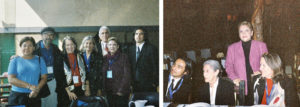
Photo Left: Meeting at 2006 Guadalajara Book Fair: María Elena Ruiz Cruz, Víctor Sahuatoba, Joanne Leedom-Ackerman, Lucina Kathmann, Luis Mario Cerda, Martha Cerda, Moisés Zamora. Photo Right: At dinner: Moisés Zamora, Nadine Gordimer, Martha Cerda, and Joanne Leedom-Ackerman
Martha Cerda, President of Guadalajara PEN, PEN Vice President Lucina Kathmann of San Miguel PEN and I met with Book Fair officials and assured that PEN would have a presence and partnership with the Guadalajara Book Fair in the years to come through its Latin American centers.
The visit to Guadalajara also offered the opportunity to meet with members from several Latin American PEN centers in a preliminary focus on the region and on the “mapping” International PEN would undertake of resources, programs and needs of the Latin American PEN centers before the 2008 Congress in the region.
******
At the end of 2006 PEN’s long time staff member Jane Spender retired. Jane had worked with Peter Day on the PEN International Magazine as an editor; she’d been administrative assistant to the Administrative Secretary Elizabeth Paterson and then became the Administrative Director when Elisabeth retired. She had taken on the role of International PEN Program Director when PEN hired an Executive Director. We all relied on Jane’s intelligence, good humor and patience. Jane and I had spent hours—too many hours we both agreed—toiling over just the right word on several documents. I was especially going to miss working with Jane; I have kept the friendship to this day. To celebrate the past and send her off with good wishes for the future, we surprised her by giving her a bicycle which I rode across the office and presented to her. Friends from International PEN and English PEN all gathered in PEN’s new offices on High Holborn. PEN is about people, and Jane was one of the stalwart ones.

Jane Spender retirement party at PEN offices, 2006. L to R: Sara Whyatt, Joanne Leedom-Ackerman, Jane Spender, Caroline McCormack, Karen Efford, Terry Carlbom, Ursula Setzer, Josephine Pullen-Thompson, Francis King, Peter Day, Gilly Vincent, Jane Spender, Nawal, Karen Efford, Elizabeth Paterson
Next Installment: PEN Journey 43: Turkey and China—One Step Forward, Two Steps Backward
PEN Journey 41: Berlin—Writing in a World Without Peace
PEN International celebrates its Centenary in 2021. I’ve been active in PEN for more than 30 years in various positions and now as an International Vice President Emeritus. With memories stirring and file drawers of documents and correspondence bulging, I am a bit of a walking archive and have been asked by PEN International to write down memories. I hope this personal PEN journey will be of interest.
I first visited Berlin in the fall of 1990 just after Germany reunited. I was living in London and took my sons, ages 10 and 12, to witness history in the making. I returned on a number of occasions, researching scenes for a book, attending meetings, and visiting German PEN in preparation for PEN’s 2006 Congress. Each time Berlin’s face was altered as the municipalities east and west moved to become one city again.
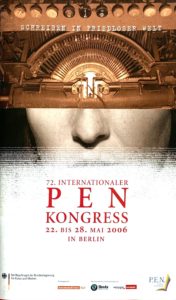
PEN International’s 72nd World Congress, Berlin, 2006
At the time of PEN’s Congress in May 2006, Berlin was bedecked with water pipes above ground—pink, green, blue, red—before the city buried its plumbing and infrastructure beneath the streets. Portions of the city had the appearance of an amusement park; there were also sections of the Berlin Wall with its colorful graffiti still standing, more as art exhibit than stark barrier to freedom.
“Welcome to a United Berlin” the German PEN President headlined his letter to the 450 delegates and participants for PEN’s 72nd World Congress. The Congress theme “Writing in a World Without Peace” was challenged by the reunification of Berlin and Germany, a historic event which bode well for the prospects of peace and which stood in contrast to the history that had come before. Yet the globe was still in conflict in the Middle East, in Asia and in Latin America where writers were under threat.
“There are countries such as Iran, Turkey or Cuba, where authors are jailed because of their books,” noted International PEN President Jiří Gruša. Resolutions at the Congress addressed the situations for writers imprisoned or killed in China, Cuba, Iran, Mexico, Russia/Chechnya, Sri Lanka, Uzbekistan, Vietnam, and other countries.
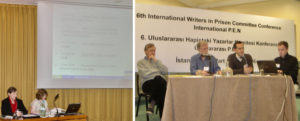
Left: Writers in Prison Committee (WiPC) meeting at Berlin Congress. Karin Clark (Chair WiPC) and Sara Whyatt (WiPC Program Director). Right: WiPC Conference in Istanbul: Eugene Schoulgin (Norwegian PEN/PEN Board), Jens Lohman (Danish PEN), Jonathan Heawood (English PEN), Notetaker
Two months before in March, over 60 writers from 27 PEN centers in 23 countries had gathered for International PEN’s Writers in Prison Committee conference in Istanbul where the WiPC planned a campaign against insult and criminal defamation laws under which writers and journalists were imprisoned worldwide. The conference also addressed the recent uproar over the Danish cartoons, impunity and the role of internet service providers offering information on writers, especially in China. A working group formed to support the Russian PEN Center which was under pressure from the Russian government.
Berlin, however, was sparkling and filled with the energy of reunification. “Today, this city—once separated by a Wall most drastically manifesting the division of Germany and Europe—has not only been re-established as the capital of Germany, but has simultaneously turned into a thriving meeting-place between East and West and North and South,” welcomed Johano Strasser, German PEN President. “Here in Berlin, history in all its facets—from the great achievements of German artists, philosophers and scientists to the crimes of the Nazis—has left its mark on the urban landscape.”
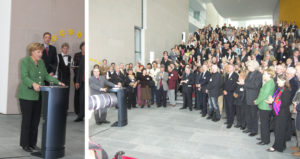
Left: German Chancellor Angela Merkel addressing PEN members at 72nd PEN Congress, 2006; Right: PEN International President Jiří Gruša speaking to PEN delegates and members at the Federal Chancellery; front row: German PEN President Johano Strasser, Chancellor Angela Merkel and PEN International Secretary Joanne Leedom-Ackerman. [Photo credit: Tran Vu]
The keynote address by Nobel laureate Günter Grass challenged the conflicts around the globe and the countries engaged in them. “There has always been war. And even peace agreements, intentionally or unintentionally, contained the germs of future wars, whether the treaty was concluded in Münster in Westphalia, or in Versailles,” he said.
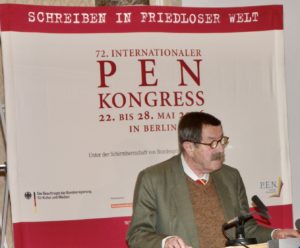
Nobel laureate Günter Grass addressing Opening Ceremony of PEN International’s 72nd World Congress in Berlin, 2006 [Photo credit: Tran Vu]
As I sat on the dais on the edge of the stage listening to this renowned German writer, I leaned over to Jiří and said, If there is a standing ovation, I can’t stand. I was concerned. Grass could say and think whatever he wanted, but PEN was a non-political organization. Whatever my views of my country’s foreign policy, I was an American; I was also the mother of a son in uniform. Jiří leaned back to me and said in effect: Don’t worry, I won’t stand either. The speech ended with applause but no ovation, and then everyone got up and went to the next event.
It wasn’t my role to argue with Günter Grass even had the occasion allowed. But it was important that PEN assure the open space for debate existed which it did later in the Congress workshops and programs. PEN was filled with a multitude of points of view among its members; it did not have a litmus test of politics, only a commitment to the free expression of ideas. It offered a wide tent where views could be debated and challenged. Dogmatic political certainties often fell on their own in the alchemy of literature and imagination.
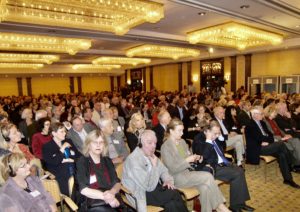
PEN members and delegates from around the world at Opening Ceremony of 2006 PEN Congress [Photo credit: Tran Vu]
Programs at the Congress also featured Nobel laureate and PEN International Vice President Nadine Gordimer and writers from around the world, including former International PEN Presidents Ronald Harwood, and György Konrád, Bei Dao, A.L. Kennedy, Margriet de Moor, Péter Nádas, Per Olov Enquist, Mahmoud Darwish, Duo Duo, Jean Rouaud, Johano Strasser, Veronique Tadio, Patrice Nganang and others. These writers participated in the literary events, including an evening of African literature and one of writers of German literature who had immigrated from abroad to Germany or had non-German cultural backgrounds. Afternoon literary sessions included prominent PEN writers introducing authors of their choice, an afternoon of essays and discussions on the theme Writing in a World without Peace and a lyric poetry afternoon.
PEN’s 85th anniversary coincided with the 60th anniversary of the United Nations. Both organizations had been founded after a World War out of an idealism that arose from desperate times with the hope that the future could be better than what had just transpired. “Both organizations were founded on a belief in dialogue and an exchange of ideas across national borders,” I noted in my address to the Assembly of Delegates. “When U.N. members were writing the Universal Declaration of Human Rights, the framers consulted, among other documents, PEN’s Charter.”
PEN also had a history with the city of Berlin, where PEN members had gathered in 1926 for the first international meeting of importance held in Berlin after World War I. At that Berlin Congress tensions had arisen among old and young writers, writers from the west and the east, and debate had flared about the political versus the nonpolitical nature of PEN. The debate that stirred in Berlin in part led to the framing of PEN’s Charter the following year.
Since those early days, PEN had grown in size beyond what the founding writers might ever have imagined. After the 2006 Berlin Congress, with the addition of centers in Jamaica, Uruguay, and Pretoria, South Africa, PEN had 144 centers in 101 countries in almost every time zone. The PEN world didn’t sleep. Someone, somewhere was always awake doing something. Through its centers PEN International participated in at least a dozen conferences around the world each year, including meetings of its standing committees. PEN thought globally but worked locally.
Berlin—with its own alterations and progress—proved a fitting location for the presentation of International PEN’s new Three-Year Plan. For the past decade, since the 75th Anniversary at the Congress in Guadalajara, PEN International had been in an organizational reformation. It now had a governing structure with a global Board that participated in decision-making; it had revised its Constitution and Rules and Regulations; it had developed a budget, increased its funding, and recently moved its offices into Central London to a larger space with cheaper pro rata rent and an elevator, which had meaning for anyone who had climbed the steep four (or five?) flights to PEN’s old offices. The staff size had also increased, and PEN had hired its first Executive Director, Caroline McCormick Whitaker, former Development Director from the British National History Museum.

International PEN Board meeting preceding 72nd PEN Congress in Berlin, May 2006. L to R: Eugene Schoulgin (Norwegian PEN), Judith Rodriguez (Melbourne PEN), Kata Kulakova (Chair Translation & Linguistic Rights Committee), Sylvestre Clancier (French PEN), Sibila Petlevski (Croatian PEN), Chip Rolley (Chair Search Committee), Karen Efford (Program Officer), Caroline McCormick Whitaker (Executive Director), Joanne Leedom-Ackerman (PEN International Secretary), Jiří Gruša (International PEN President), Peter Firkin (standing—Centers Coordinator), Eric Lax (PEN USA West), Jane Spender (Programs Director), Judith Buckrich (Women Writers Committee Chair)
Because British charitable tax law had changed, the opportunity had also arisen to unite International PEN and the International PEN Foundation into one charitable organization: International PEN, Ltd, a step that would provide the legal framework and protection for the organization and PEN’s name, would limit personal financial liability of the Board and attract a wider funding base. At the Berlin Congress, resolutions and approval were endorsed for this step which would be finalized the following year at the 2007 Congress in Dakar.
Caroline Whitaker took the Assembly of Delegates through the Three-Year Plan which had been developed after widespread consultation with PEN centers and the Board. She acknowledged that PEN couldn’t do everything that everyone wanted right away, that it was necessary to focus resources even as PEN developed more resources.
The Plan, which had grown out of all the discussions and preceding plans, concentrated on PEN’s three missions: to promote literature, to protect freedom of expression and to build a community of writers. “International PEN will work regionally to connect the activity of its many Centers around the globe on these issues,” Caroline told the delegates.

All PEN’s Standing Committees met at Berlin Congress—Writers in Prison Committee, Translation and Linguistic Rights Committee, Women Writers Committee and Peace Committee [Photo credit: Tran Vu]
In helping to develop PEN’s centers, the Three-Year Plan recommended International PEN focus on one region at a time, beginning with Africa where the 2007 PEN Congress would be held. International PEN would assist in programming and fundraising for development of PEN’s African Centers. The next regional focus would be Latin America, where PEN’s 2008 Congress was to be held. This rolling focus would allow the limited international staff to plan strategically. Regular daily work would still continue for the needs of centers in all regions.

PEN members met in workshops at 72nd Berlin Congress. Topics: PEN in the World—Global Issues; Education; the Strategic Plan; Centers; Networks and Partners; Asia and Central Asia; Middle East; Africa; Europe and Americas [Photo credit: Tran Vu]
As International PEN’s work had taken me across the globe that year, I’d come to see that PEN and its members formed a kind of intricate net which helped hold civil society together, the kind of sturdy net used on hills to prevent landslides. In a way that is what PEN members did around the world. They helped prevent literary culture and languages and freedom of expression from slipping away by both their active programming and their defensive actions
At the 1926 PEN Congress in Berlin International PEN’s President John Galsworthy and PEN’s founder Catherine Amy Dawson Scott had their voices recorded and preserved in a project of the German state. Galsworthy read a page from his Forsyte Saga. According to Dawson Scott’s journal, she recorded the following: “Even as individuals become families and families become communities and communities become nations, so eventually must the nations draw together in peace.”
It was a worthy, if not yet realized goal, but at least in PEN we had a global family.

Mayor’s reception for PEN members and participants at 72nd World Congress in Berlin, May 2006 [Photo Credit: Tran Vu]
Elections at 2006 Congress:
International PEN President: Jiří Gruša was re-elected for further 3-year term.
International PEN Board: Cecilia Balcazar (Colombian Center) and Eugene Schoulgin (Norwegian PEN re-elected to the Board)
Vice Presidents: Toni Morrison (American PEN) and J.M. Coetzee (Sydney PEN) elected Vice Presidents for service to literature and Gloria Guardia (Panamanian Center) for service to PEN
Women Writers Committee: Judith Buckrich (Melbourne Center) re-elected as Chair
Translation and Linguistic Rights Committee: Carles Torner (Catalan PEN) stood down as Vice Chair, replaced by Josep Maria Terricabras (Catalan PEN)
Next Installment: PEN Journey 42: From Copenhagen to Dakar to Guadalajara and in Between
PEN Journey 4: Freedom on the Move: West to East
PEN International celebrates its Centenary in 2021. I’ve been active in PEN for more than 30 years in various positions. With memories stirring and file drawers bulging, I am a bit of a walking archive and have been asked by PEN International to write down memories. I hope this personal PEN journey will be of interest.
I have attended 32 International PEN Congresses as president of a PEN Center, often as a delegate, as Chair of the International Writers in Prison Committee, as International Secretary and now as Vice President. The number surprises me when I count. The Congresses have been held on every continent except Antarctica. Many were grand affairs where heads of State such as Vaclav Havel in Czechoslovakia, Angela Merkel in Germany, Abdoulaye Wade in Senegal greeted PEN members. Some were modest as the improvised Congress in London in 2001 when PEN had to postpone the Congress planned in Macedonia because of war in the Balkans. PEN held its Congress in Ohrid, Macedonia the following year. At these Congresses writers from PEN centers all over the globe attended. Today PEN International has centers in over 100 countries.
Among the more memorable and grand was the 54th PEN Congress in Canada, held in September 1989 when PEN still held two Congresses a year. The Canadian Congress, staged in both Toronto and Montreal by the two Canadian PEN centers, moved delegates and participants between cities on a train. The theme—The Writer: Freedom and Power—signaled hope at a time when freedom was expanding in the world with writers wielding the megaphone.
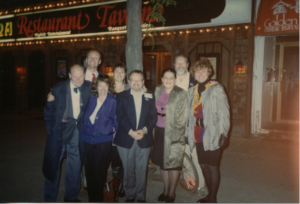
54th PEN Congress in Canada, 1989. Front row: WiPC chair Thomas von Vegesack, Joanne Leedom-Ackerman and PEN USA West Executive Director Richard Bray. Back row: Digby Diehl (right) and other delegates.
The literary programs included luminary writers from over 25 countries, including Margaret Atwood (Canada), Chinua Achebe (Nigeria), Anita Desai (India), Tadeusz Konwicki ( Poland), Claribel Alegria (El Salvador), Margaret Drabble (England), Michael Ignatieff (Canada), Ama Ata Aidoo (Ghana), Derek Walcott (St. Lucia), John Ralston Saul (Canada), Duo Duo (China), Harold Pinter (England), Tatyana Tolstaya (USSR), Alice Munro (Canada), Wendy Law-Yone (Burma), Larry McMurtry (USA), Emily Nasrallah (Lebanon), Yehuda Amichai (Israel), Maxine Hong-Kingston (USA), Michael Ondaatje (Canada), Nancy Morejn (Cuba), Jelila Hafsia (Tunisia), Miriam Tlali (South /Africa), and dozens more, and other writers listed in absentia such as Vaclav Havel (Czechoslovakia) and writers from Iran, Turkey, Hungary, South Africa, Morocco and Vietnam. PEN members and delegates attended from at least 57 PEN centers around the world.
The new PEN International President Rene Tavernier, a poet who had been active in the French resistance during World War II, hailed the importance of the writer’s role in upholding freedom of expression around the globe and in confronting central power which restricted individual voices. PEN’s and the writer’s only weapon was the word, he said, and the word must be used in service of “creative intelligence, human rights, lucidity and hope.” Though the twentieth century had seen “the growth of new and atrocious ideologies with their police forces and concentration camps, they could not change the spirit of man, which is what PEN defends,” he said. PEN’s concern was literature and ideas and conversations among writers, who may not always agree.
A goal of the Congress was to expand dialogues among people, especially in Muslim communities in the wake of the fatwa and to expand PEN’s reach into Africa, the Middle East and Latin America. Today PEN centers in those areas have grown exponentially with 33 centers in Africa and the Middle East and 19 centers in Latin America, though participation from these centers in global forums still remains challenging.
Another outcome of the Congress was the formation of the PEN Women’s Network, a precursor to the Women’s Committee established as a standing committee of PEN two years later at the 1991 Vienna Congress. The Canadian Congress organizers had balanced literary panels and discussions among men and women, a response to the growing voice of women in PEN and to the 1986 New York Congress where men dominated the forums. Some opposed a Women’s Committee, including English PEN which voiced concern that it would fragment and divide members when the goal of PEN was to bring people together. English PEN already operated under a guideline that balanced men and women in leadership. PEN International Vice President Nadine Gordimer wrote that she had “more pressing obligations here, at home in South Africa, towards the needs of both women and men who are writers under our difficult and demanding position, beset by censorship, harassment, and lack of educational opportunities common to both sexes.” But she added that she hoped if a committee did form, it would be in touch with all South African writers.
PEN USA West presented a resolution on South Africa at the Congress, protesting the arrest and treatment of a number of writers, including our honorary member. The resolution passed unanimously in the Assembly of Delegates.
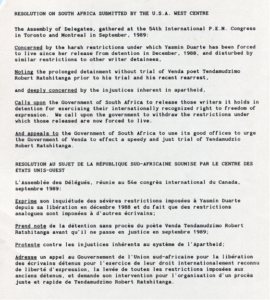
My fellow delegate and I also joined American PEN as well as Canadian PEN, Hong Kong and Taipei PEN in a resolution protesting the “slaughter of Chinese citizens peacefully assembled in and around Beijing’s Tiananmen Square” three months before and the arrest of writers, including Liu Xiaobo and over 20 others. It was feared some of the China PEN members might be under threat. Neither the China Center nor the Shanghai Center were present at the Canadian Congress, but they had been in touch with PEN International. In an official communication the Shanghai Center protested that China was being slandered abroad. Representatives from the two Chinese Centers had demanded an apology from PEN International because poet Bei Dao had been allowed to address the Maastricht Congress (see PEN Journey 3) and they continued to argue that PEN’s main case Wei Jingsheng was not a writer. An apology was not offered, and the resolution protesting the killings and arrests after Tiananmen Square passed with one abstention. Delegates from the China Center and Shanghai Center didn’t return to a PEN Congress for the next two decades, but in the intervening years, individual centers and members such as Japanese writers stayed in touch. In 2001 an Independent Chinese PEN Center (ICPC) formed and gave a place for Chinese writers inside and outside of China to communicate with discussion and debate on freedom of expression and democracy. PEN currently has more than half a dozen centers of Chinese writers, including the China, Shanghai, ICPC, Taipei, Hong Kong, Tibet, Uyghur, and Chinese Writers Abroad centers.
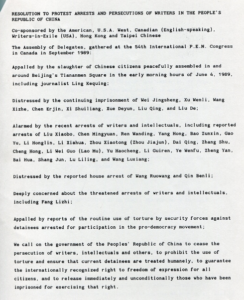
The challenge for PEN has always been how best to use its formal resolutions, written in the language of the United Nations. These are passed then directed to the respective governments, to United Nations forums and to embassies and officials in the countries where PEN has centers and to the media. The effort begins at the PEN International office and then fans out through the centers. The impact of the resolutions vary according to country and to the direct advocacy efforts. However, the climate for such resolutions has altered over the years, and it is an ongoing question what is the most impactful method for effecting change.
At the Canadian Congress the situation in Myanmar/Burma was also highlighted. Our center, along with Austrian, Australian (Perth), and Canadian centers presented a resolution protesting the slaughter of Burmese citizens and the wholesale arrests and imprisonment without trial of citizens, including writers, after the imposition of martial law. I met one of these writers—Ma Thida—in London years later after PEN had advocated aggressively for her release. She’d spent almost six years in prison. A physician, writer and editor and an assistant for Aung San Suu Kyi, she remained committed to freedom for her country. It took another 15 years before the Myanmar government eased restrictions and a civilian government took over. When the political situation in Burma/Myanmar began to open, Ma Thida, Nay Phone Latt and other writers, many of whom had been in prison, formed a PEN Myanmar Center which joined PEN’s Assembly at the 2013 Congress in Reykjavik, Iceland. Ma Thida was its first president, and she now serves on the International Board of PEN.
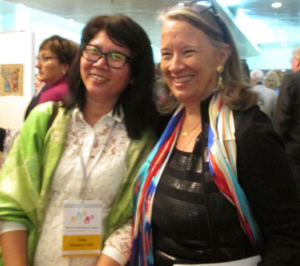
Ma Thida and Joanne Leedom-Ackerman at the PEN Congress in Bishkek, Kyrgyzstan in October 2014
For me, the outward facing Canadian Congress mirrored my own preparation for moving with my family to London three months later in January 1990. It was a fortuitous time to live in Europe as Eastern Europe was opening to the West. Six weeks after the PEN Congress, East Germany announced that its citizens were free to cross into the West, and the Berlin Wall began to crumble figuratively and literally as citizens used hammers and picks to knock down the looming concrete structure. In fall 1990, I took my sons, ages 10 and 12, to East Berlin, and we too climbed up on ladders with metal rods and knocked down the wall, chunks of which we still have.
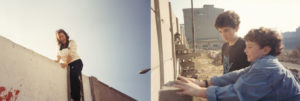
Joanne and sons Elliot and Nate at the Berlin Wall, Fall 1990
At the Canadian Congress, PEN International’s Writers in Prison Committee (WiPC) Chair Thomas von Vegesack asked that a sub-committee be formed to assist in fundraising. Eight centers—Australian (Perth), Canadian, Swedish, Norwegian, West German, English, American and USA West agreed to help. Because I was moving to London where PEN International was headquartered, Thomas asked if I would head the effort. I told him I wasn’t able to do so but agreed to take on the interim position and help him find a chair and then agreed to take on the task of getting PEN International charitable tax status. I assumed the latter mission would be fairly straightforward, a matter of finding the right law firm to assist. Little did I know the complications of British charitable tax law. Eventually Graeme Gibson, president of PEN Canada, novelist and partner of Margaret Atwood, agreed to head the development effort.
After I arrived in London, I found a law firm. Charitable tax status would relieve PEN of tax bills it found hard to pay and also help with fundraising, but so far PEN had not been able to secure the charitable status. Thomas and I, along with the International Secretary Alexander Blokh, Treasurer Bill Barazetti and Administrative Secretary Elizabeth Paterson met frequently at the PEN International offices at the top of four (or was it five?) very steep flights of stairs in the Charterhouse Buildings where we worked on what turned out to be a two-year project that included the establishment of the International PEN Foundation. The Foundation was allowed to raise tax-exempt funds for the “charitable” work of PEN which could not include perceived “political” work, but only the “educational” aspects.
It took a young American who didn’t know it was impossible to do what we have not been able to do, Antonia Fraser said to me as she joined the first board of the International PEN Foundation in 1992. In a way she was right for I had no idea the complexity of British tax law, quite different than America’s. I wasn’t prepared for the sets and sets of documents and negotiations, the time required to set up a separate organization; on the other hand, the effort opened up the workings of PEN International to me and introduced me to friends I’ve maintained over the decades who also worked on the project. On the Foundation board with me were a majority of British citizens (and PEN members), including Antonia Fraser, Margaret Drabble, Buchi Emecheta, Andre Schiffrin, Christopher Sinclair-Stevenson and later Ronald Harwood as well as a few other international members, PEN’s International Secretary, Treasurer and the new PEN President Gyorgy Konrad.
Harold Pinter’s play Moonlight premiered as the first fundraising event of the International PEN Foundation on October 12, 1993 at the Almeida Theater. Dramatically, the lights of the theater burnt out just before the performance, and the play was performed by candlelight.
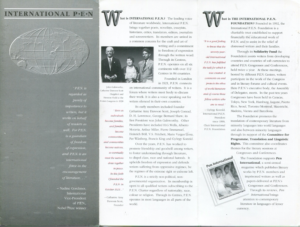
First International PEN and PEN Foundation brochure.
Next Installment: PEN Journey 5: PEN in London, Early 1990’s